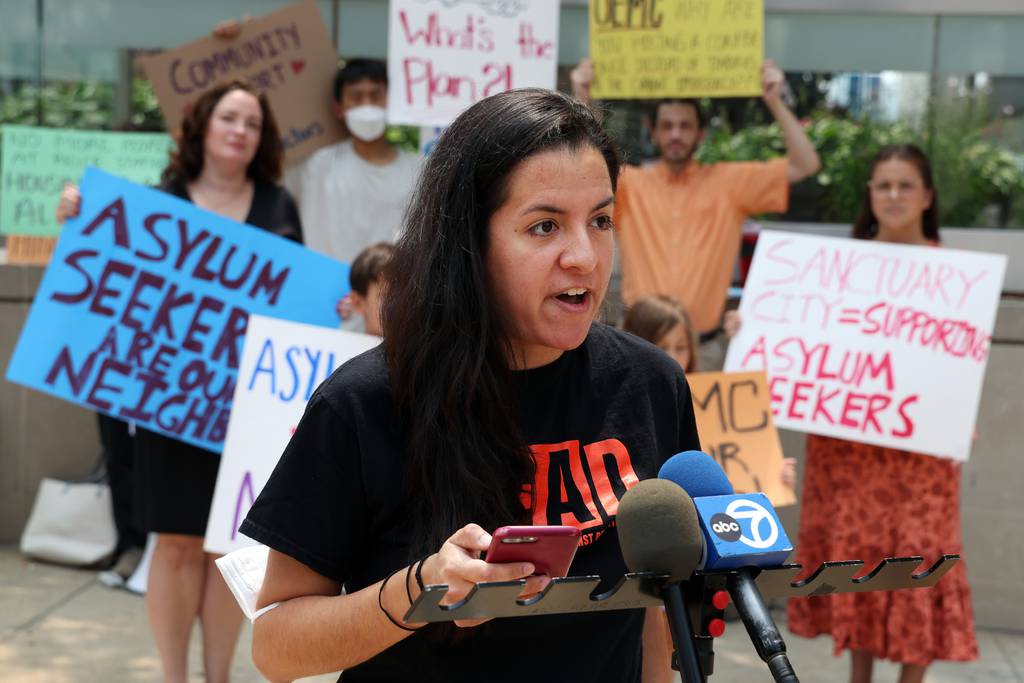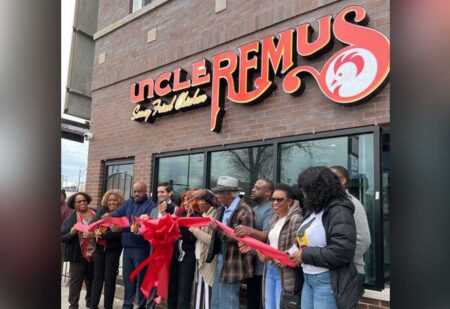A small group of protesters gathered Monday outside the Hyatt Regency hotel downtown, where the city’s Office for Emergency Management and Communications was hosting the 18th annual National Homeland Security Conference, to demand that the agency improve its emergency response plan in caring for the thousands of recently arrived migrants in Chicago.
“We come to the steps of the OEMC conference, frustrated and ashamed that one of the institutions that is supposedly tasked with ensuring the well-being of people in an emergency, today is taunting their budget and nonexistent support,” said Organized Community Against Deportations organizer Xanat Sobrevilla at a news conference, which included about 20 volunteers who care for migrants sheltering in police stations.
Almost a year after the first buses of migrants arrived in Chicago from Texas in late August 2022, volunteers say the city has struggled to efficiently deploy resources in order to feed and house over 10,000 asylum-seekers. Currently, over 6,000 asylum-seekers are staying at temporary shelters and sleeping on the floors of police stations, in some of which staff members and police officers have been accused of mistreatment and sexual misconduct against migrants.
Since March, the Police Station Response Team — which is not affiliated with the Police Department — has been one of countless volunteer groups in the Chicagoland addressing what they call the “survival needs” of newcomers living in provisional shelters.
“If volunteers don’t show up at police stations with food and bedding when the next bus comes, then people will go hungry and they will sleep on cold hardwood floors,” said Halle Quezada, volunteer with PSRT.
Community organizations and volunteers are claiming that OEMC is neglecting its duties — which the city’s website says include public safety planning and coordination for large-scale events, emergencies and disasters — and demanding that the agency assume responsibility to regularly deliver food, provide clothing and secure housing for migrants.
The OEMC was meeting Monday with government agencies, nonprofits, business owners, universities, and other officials on the topic of homeland security, public safety and emergency management.
“This is an ever-growing humanitarian crisis that Chicago has not experienced before, and that poses significant infrastructure challenges to an already overwhelmed shelter system, Chicago police districts, our city agencies, mutual aid partners, volunteers, and community residents,” said Mary May, OEMC spokeswoman. “Our commitment continues to be to decompress the police stations and move people into shelters, putting them on a path to resettlement and self-sufficiency. We continue to identify potential shelter locations on city-owned property as well as other options in order to open new shelters.”
Quezada’s own children, 8 and 6, held up signs behind her as she spoke. Her kids are uniquely familiar with the migrant crisis, Quezada told the Tribune, because she has been hosting migrants and their families in her own home as they transition into more permanent housing.
“In the absence of that preparedness and coordination by OEMC, individual Chicagoans are providing front-line care to people arriving here. We have been, for months, and we are tired,” Quezada said. “We are here today because Chicago deserves a government that can see us through crisis. Public safety in our communities means that people have their basic survival needs met. Public safety means that the children who go to school with my kids have a bed to sleep on at night.”
[ What to know about Chicago’s migrant crisis ]
Sobrevilla also highlighted the critical role that neighbors, volunteers and local collectives have played in caring for migrants, from navigating check-ins with Immigration and Customs Enforcement to coordinating breakfast, lunch and dinner deliveries to shelters and police stations.
“The arrival of tens of thousands of people forced to leave their homes and communities to just barely survive, to find food, safety and hope, has exposed an inadequate system of care in Chicago — one we have had to patch on the fly,” she said. “We shall continue to demonstrate our capacity of care as human beings, independent of the state.”
Volunteers are also asking the city to end its contract with Favorite HealthCare, a Kansas-based agency that staffs and runs city migrant shelters. This month, the city’s Department of Family and Support Services awarded Favorite a contract worth up to $30 million to continue to staff the city’s 12 shelters.
Referencing reports they have received of alleged mistreatment at shelters run by Favorite staffers, volunteers say that hiring local Chicagoans to run these operations would increase community trust and build a sustainable support network for migrants. Favorite HealthCare was not immediately reachable for comment.
PSRT volunteer Leah Rogers and other critics also say the legal process of applying for asylum is unnecessarily drawn out and creates dependence on staff instead of increasing the self-sufficiency of these new Chicago residents who are “ready and willing to work and care for themselves.”
Sobrevilla, herself an immigrant and a Deferred Action for Childhood Arrivals program recipient, has lived in the Chicago area for 27 years and has organized against what she calls the “deportation apparatus” for over a decade.
Even after enduring months of pain, starvation and danger on their way to the U.S., Sobrevilla said, migrants have to stand a fighting chance against “a deportation machine” while they try to adapt to living in Chicago.
“To make matters worse, asylum-seekers have no (viable) way of leaving the shelter system because it takes over five months for the government to grant them a work permit once they have applied for asylum,” Rogers added. “Why isn’t this city allocating money to help people access legal services when they apply for asylum and work permits? The city of Chicago has chosen to waste taxpayer dollars on a system of dependency with no regard for human dignity, public safety or sustainability.”
Quezada said that, while volunteers are tired and desperate for help from the city, the people arriving in Chicago to seek asylum are not a burden.
“The utter lack of coordination and preparation from our city departments — that is the burden,” Quezada said. “These predatory contracts that are absconding with our tax dollars and exponentiate the suffering — that is the burden. And a government that, in the absence of systems of care, will not allow people to care for themselves — that is the burden.”
Chicago Tribune’s A.D. Quig contributed.







